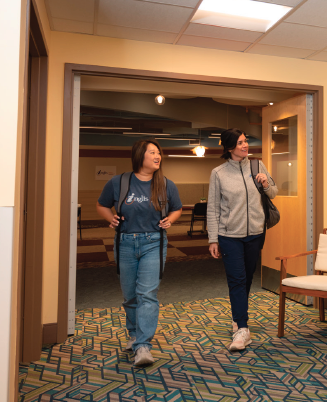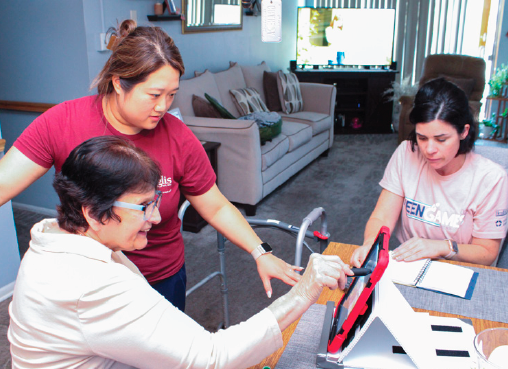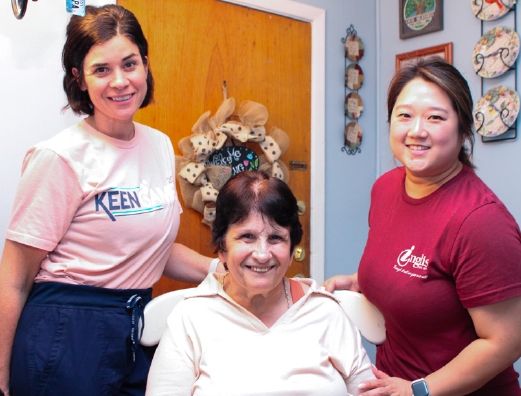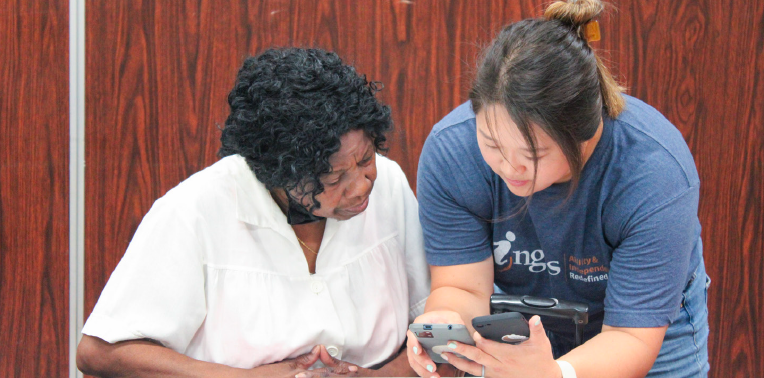January 29, 2025
Staying “Connected” How Inglis Assistive Technology Services Program is Taking Supports Straight to the Community
By Lauren Tilghman
 In a second-floor classroom, Janet Shoemaker, an educator in Inglis’ Assistive Technology Solutions (IATS) program, took an eraser to a dust-ridden green chalkboard. She wiped it back and forth vigorously before picking up a small piece of chalk and scribbling out a list of web platforms. Yahoo... Gmail... AOL... Hotmail... Outlook... Comcast. She turned to face a room of 10 older adults all roughly in their late 60s, 70s, and 80s. “Can anyone tell me which of these their e-mail address is connected to?” Shoemaker asked.
In a second-floor classroom, Janet Shoemaker, an educator in Inglis’ Assistive Technology Solutions (IATS) program, took an eraser to a dust-ridden green chalkboard. She wiped it back and forth vigorously before picking up a small piece of chalk and scribbling out a list of web platforms. Yahoo... Gmail... AOL... Hotmail... Outlook... Comcast. She turned to face a room of 10 older adults all roughly in their late 60s, 70s, and 80s. “Can anyone tell me which of these their e-mail address is connected to?” Shoemaker asked.
From July through September, the Inglis Assistive Technology Solutions (IATS) program led a 10-week tech class funded by the PA Link’s Aging and Disability Resource Centers (ADRC) for older adults at the Philadelphia Senior Center on Broad Street. The class which served roughly 20 students, in biweekly groups, walked seniors through the basics of using their smartphones, managing their online presence, and keeping themselves protected from digital threats and fraud. For students like Helen Shick the class became a place where she could get help understanding the variety of applications that her children had put on her smartphone to help her navigate transportation; many of them left her less confident in her ability to use them and even more confused. “Sometimes [I’m] overwhelmed, sometimes it’s good, and sometimes I don’t know how to use it. Suddenly something’s wrong, so I don’t know how to solve it,” shared Shick.
According to the Pew Research Center, just 26% of internet users ages 65 and over say that they feel very confident when using computers, smartphones, or other electronic devices to do the things they need to do online. Roughly one-third describe themselves as only a little (23%) or not at all (11%) confident in their ability to use electronic devices to do necessary online activities.
Grant funding and individual giving to the IATS program has provided tech support and education to disabled and/or aging adults residing outside of the Inglis House community since 2012. Some receive services in a group setting like the students at the Senior Center, whereas others may be receiving individualized support or consultations, sometimes on a one-time basis or in a regular cadence of appointments.

When the Program first launched it was sponsored by a grant from Pew Charitable Trusts and focused on a very specific age and disability demographic, supporting over 200 recipients. “It spawned a real awareness of the need for assistive technology, the lack of education [around it], the lack of access, and the lack of exploration of what’s out there and available,” shared Katherine (Katie) Griffiths, IATS Educator.
“Some of our first clients were folks that had the Tobii eye-gaze systems that, you know, received the device but didn’t have the training needed to use the device. And there were people in the community that, like, needed help writing a resume, or needed to just borrow a laptop to recover an email or create an email address to get an accessible phone. So that’s really how it all started.”
In 2019 the community-based IATS program expanded with the opening of the Inglis Innovation Center Philadelphia, which opened the doors to serving a greater diversity of people with assistive tech needs. Since its relaunch over 150 people have received services and/or tech devices.). Until recently the program only served people residing in the Greater Philadelphia area, including the five southeastern counties—Chester, Bucks, Delaware, Montgomery, and Philadelphia; in 2023 the program expanded to serve the Pittsburgh area with the opening of Inglis’ second Innovation Center. “When Inglis announced the opening of our Innovation Center in Pittsburgh with support from Highmark Wholecare, the energy around this project was substantial,” shared program director Charles Sammartino.
“Having provided community-based assistive technology services in Philadelphia since 2012, we’ve come to deeply understand the transformative impact of technology on individuals’ lives. Expanding to Pittsburgh presented us with an incredible opportunity to learn from and engage with a new community. While Philadelphia and Pittsburgh have their own unique challenges, the need remains the same—to promote and support individuals with technology-based solutions that empower them in their daily lives.”
Western Pennsylvania residents like Tim Bass learned about Inglis’ technology education and service offerings on social media. Tim experienced a medical emergency and was paralyzed from the shoulders down. After his injury, he became heavily reliant on his wife for all of his daily activities—including connecting with family and friends. After finding IATS’ ad on social media, Tim connected with Jeff Ruffing, Inglis Assistive Technology Development Specialist, virtually and learned about several accessible features and adaptations that he could make on his smartphone to enable more voice controls. After a few Zoom sessions with Jeff, Tim began navigating and researching more accessible features on his own. He credits Jeff and Inglis for “giving him his life back,” now that he’s able to connect with his family and friends more independently. He’s even learned to operate his television and other appliances in his home with the addition of smart devices like an Amazon Echo Show and various smart plugs.

Tim is one of many community members who have benefitted from the one-on-one customer service that the IATS program provides. Helen Cooney, a Delaware County resident, has been receiving in-home tech support for over 10 years. Cooney, a former volunteer at Inglis House, was well-versed in the work the IATS program was doing for residents but never could have imagined how it would help her personally. As her cerebral palsy began to significantly limit her mobility, the IATS program provided her assistance in learning how to use her iPad for more of her daily activities— such as scheduling her doctor appointments through portal applications, downloading audiobooks for free via her local public library, and most importantly connecting with her grandchildren regularly through FaceTime. IATS Educators Janet and Katie check in and visit Helen several times a year to update her device, help answer any questions she has, and ensure the accessibility features are adapting to Helen’s needs. While those needs have changed, Helen’s confidence and unwavering desire for independence have not; if anything, the tech support she receives is a constant reminder of what’s possible for her to continue to accomplish on her own. “It makes me feel important, it makes me feel that I can do it, and it makes me feel really good,” shared Cooney.
As the IATS program continues to support more people, it has begun to partner with Community HealthChoices Managed Care Organizations while continuing to advocate for assistive technology services across the State. The future of the program is more promising than ever, and so is the independence of the Pennsylvania disabled and aging community.

